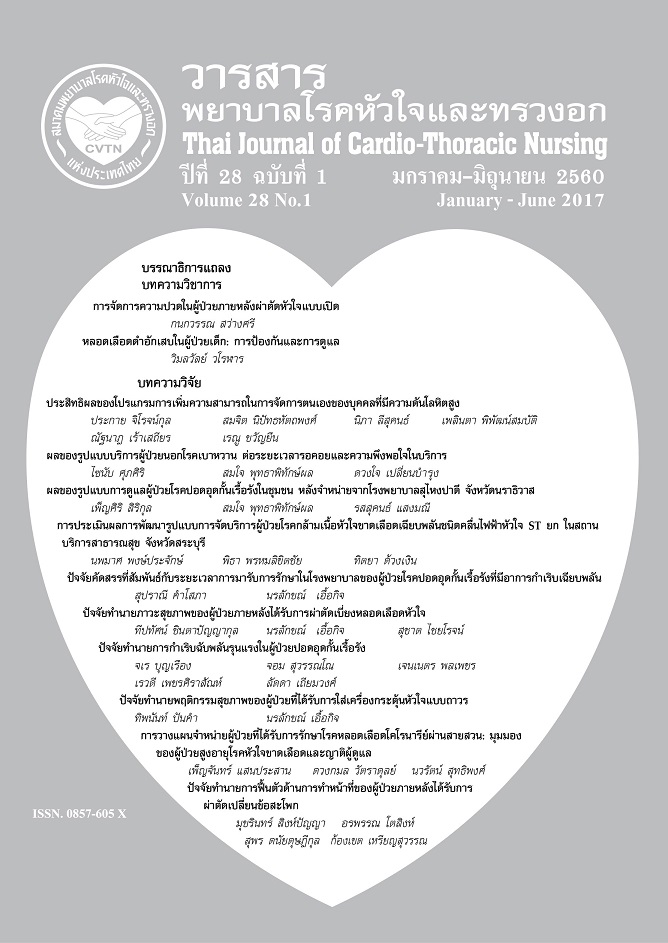ปัจจัยทำนายพฤติกรรมสุขภาพของผู้ป่วยที่ได้รับการใส่เครื่องกระตุ้นหัวใจแบบถาวร
Keywords:
ปัจจัยทำนาย, พฤติกรรมสุขภาพ, เครื่องกระตุ้นหัวใจแบบถาวร, predicting factors, health behavior, cardiac permanent pacemakerAbstract
การวิจัยเชิงพยากรณ์นี้ มีวัตถุประสงค์เพื่อศึกษาหาอำนาจการทำนายของปัจจัยนำ (ความรู้ อัตมโนทัศน์ และความรู้สึกมีคุณค่าในตนเอง) ปัจจัยเสริม (การสนับสนุนทางสังคม) และปัจจัยเอื้อ (การเข้าถึงบริการของสถานบริการสุขภาพ) ต่อพฤติกรรมสุขภาพของผู้ป่วยที่ได้รับการใส่เครื่องกระตุ้นหัวใจแบบถาวร กลุ่มตัวอย่างเป็นผู้ป่วยจำนวน 128 คน ที่มารับบริการแผนกผู้ป่วยนอก คลินิกเครื่องกระตุ้นหัวใจ โรงพยาบาลตติยภูมิสามแห่งในเขตกรุงเทพมหานคร คัดเลือกโดยวิธีการสุ่มแบบหลายขั้นตอน เครื่องมือที่ใช้ในการเก็บข้อมูล ได้แก่ แบบบันทึกข้อมูลส่วนบุคคล แบบวัดความรู้ แบบวัดอัตมโนทัศน์ แบบวัดความรู้สึกมีคุณค่าในตนเอง แบบวัดการสนับสนุนทางสังคม แบบวัดการเข้าถึงบริการของสถานบริการสุขภาพ และแบบวัดพฤติกรรมสุขภาพ วิเคราะห์ข้อมูลโดยใช้สถิติพรรณนา และสถิติถดถอยพหุคูณแบบเข้าทีละตัว
ผลการศึกษาพบว่า กลุ่มตัวอย่างมีพฤติกรรมสุขภาพโดยรวมอยู่ในระดับดี (mean = 33.3, SD = 3.9) การสนับสนุนทางสังคมความรู้ และอัตมโนทัศน์ มีความสัมพันธ์ทางบวกกับพฤติกรรมสุขภาพของกลุ่มตัวอย่าง (r =.523, .508 และ .369 ตามลำดับ) แต่ความรู้สึกมีคุณค่าในตนเองและการเข้าถึงบริการของสถานบริการสุขภาพไม่มีความสัมพันธ์ทางสถิติกับพฤติกรรมสุขภาพ ความรู้ อัตมโนทัศน์ ความรู้สึกมีคุณค่าในตนเอง การสนับสนุนทางสังคม และการเข้าถึงบริการของสถานบริการสุขภาพ สามารถร่วมทำนายพฤติกรรมสุขภาพ ได้ร้อยละ 44
ผลการศึกษาครั้งนี้ พยาบาลสามารถนำไปประยุกต์ใช้ในการพัฒนาโปรแกรมส่งเสริมพฤติกรรมสุขภาพของผู้ป่วยที่ได้รับการใส่เครื่องกระตุ้นหัวใจแบบถาวร โดยเน้นการให้ความรู้ การส่งเสริมอัตมโนทัศน์ และการส่งเสริมการสนับสนุนทางสังคม เพื่อให้ผู้ป่วยสามารถปรับเปลี่ยนพฤติกรรมสุขภาพได้อย่างเหมาะสม
Predicting factors of health behaviors in patients with cardiac permanent pacemaker
The purpose of this predictive research study were to predict the health behaviors in patients with cardiac permanent pacemaker, by knowledge, self-concept, self – esteem, social – support, accessibility of service and health behavior. One hundred and twenty-eight out-patients with cardiac permanent pacemaker both male and female were recruited from a multistage random sampling in the cardiac permanent pacemaker clinic at three tertiary hospitals. The instruments were demographic record form, knowledge measurement scale, Tennessee self-concept scale, Rosenberg self-esteem scale, The ENRICHD social support instrument, accessibility of service questionnaire and health behavior questionnaire. Descriptive statistics, Pearson’s product moment correlation coefficient and enter regression were used to analyze data.
Findings indicated that the mean score of health behaviors among patients with cardiac permanent pacemaker was good (mean = 33.3, SD = 3.9). Social – support, knowledge, and self-concept were positively related to health behaviors significantly (r =.523, .508, and .369 respectively). There were no relationship of self – esteem and accessibility of service on health behaviors in patients with cardiac permanent pacemaker. In addition, knowledge, self-concept, self – esteem, social – support, and accessibility of service were good predictors for health behaviors. Variables accounted for 44% (R2= 0.44, p < .05) of total variance in health behaviors.
The results would be helpful for nurses to develop the health promoting program of health behaviors for patients with cardiac permanent pacemaker by focusing on knowledge, self-concept with social – support in order to modify appropriate health behaviors.
Downloads
How to Cite
Issue
Section
License
บทความนี้ยังไม่เคยตีพิมพ์หรืออยู่ในระหว่างส่งไปตีพิมพ์ในวารสารอื่น ๆ มาก่อน และกองบรรณาธิการขอสงวนสิทธิ์ในการตรวจทาน และแก้ไขต้นฉบับตามเกณฑ์ของวารสาร ในกรณีที่เรื่องของท่านได้ได้รับการตีพิมพ์ในวารสารฉบับนี้ถือว่าเป็น ลิขสิทธิ์ของวารสารพยาบาลโรคหัวใจและทรวงอก






